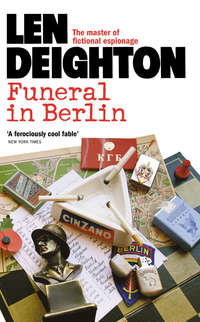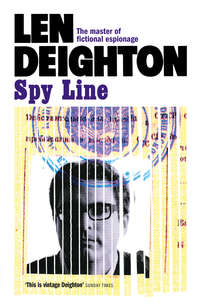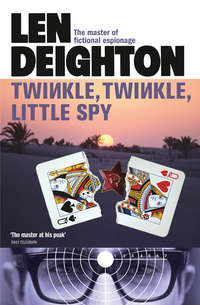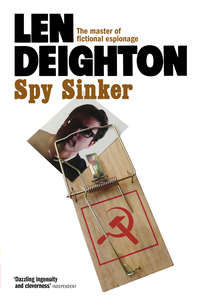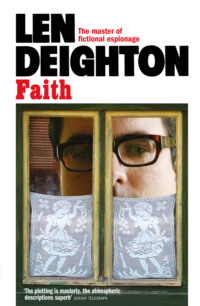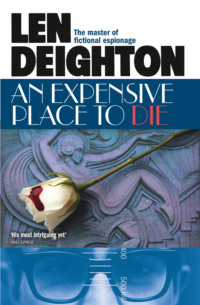
Полная версия
Hope
‘No, I’m not London staff either. I’m on a five-year contract that can be terminated any time that someone on the top floor sends me for a medical check-up having told their tame quack to give me a thumbs-down.’
‘That’s a bloody disloyal thing to say,’ said Dicky, always ready to speak on behalf of the top-floor staff. ‘No one gets treated like that. No one! We are a family. It doesn’t serve your cause to become paranoid.’
I’d heard all that before. ‘If I’m to go schlepping around these hotels for you, I must go back on to my proper field agent per diem, with expenses and allowances.’
‘Don’t moan, Bernard. You are an awfully nice chap until you start moaning.’
‘What I’m saying…’
He waved his injured hand airily above his head. ‘I’ll see to it, I’ll see to it. If you’d rather be a field agent than wait for a proper senior staff position in London.’ I never knew how to deal with Dicky’s bland reassurances. I felt unable to pursue my argument, despite knowing that he had no intention of doing anything about it.
‘You want me to go chasing rainbows,’ I said. ‘This is Switzerland, it will cost a fortune. I must have an advance. Otherwise I’ll be spending my own money and waiting six months while London processes the expenses.’
‘Chasing rainbows?’
‘Look, Dicky. George Kosinski isn’t skulking around in some local hotel here; he’s gone.’
‘The girl told you?’
‘She thinks he’s gone skiing on the glacier.’
‘Why?’ Dicky chewed on his fingernail, anxious that he’d missed an opportunity. ‘Did Kosinski tell her that?’
‘He bought silk underwear and a ski jacket last week.’
‘That settles it then.’
‘George hates skiing,’ I explained. ‘He’s hopeless on skis and hates ski resorts.’
‘What then?’ said Dicky.
‘For one thing his bags have gone. It looks like he went to the airport in secret, and left them there ahead of time. He obviously wanted to get away without attracting attention; but who was he trying to avoid? And why?’
‘And where?’ added Dicky. ‘Where has he gone?’
‘Somewhere that gets damned cold; hence the silk underwear. My guess is Poland. He has a lot of relatives there: brothers, uncles, aunts and maybe a still-living grandfather. If he was in trouble, that’s where he might well go.’
‘We can’t depend on a few odds and ends of guesswork, Bernard.’
‘George has been raiding his old photo albums for snapshots to take along. He also took the rosary his mother gave him. It’s a trip to his family. Perhaps that’s all it is. Maybe someone is sick.’
‘That’s not all it is. Someone came here and talked to him. We know the Stasi people came through here.’
‘The girl said no one came to visit,’ I countered. I didn’t want Dicky to condemn George and then start collecting evidence.
Even Dicky could answer that one: ‘So Kosinski went out and met them somewhere else.’
‘It’s possible,’ I said. ‘But that doesn’t prove that there is anything sinister about his disappearance.’
‘I don’t like it,’ said Dicky. ‘It smells like trouble… with all that Tessa business, we can’t afford to just shrug it off. We must know for certain where he’s gone.’
‘He’s gone home to Poland,’ I said again. ‘It’s only a guess, but I know him well enough to make that kind of guess.’
‘No zlotys from the bank?’
It was a joke but I answered anyway. ‘They are not legally sold; he’d be better off with US dollar bills.’
A long silence. ‘You’re not just a pretty face, Bernard,’ he said, as if it was a joke I’d never heard before.
‘I may be wrong.’
‘Where in Poland?’
‘I got the office to sort out his passport application. His parents were from a village in Masuria, in the north-east. His brother Stefan lives in that same neighbourhood.’
‘What are you holding back, old bean?’ Dicky asked.
‘The Poles in London are a small community. I made a couple of calls from my room… a chap who runs a little chess club knows George well. He says George goes back sometimes and sends his family money on a regular basis.’
‘And?’ he persisted.
‘I can’t think of anything else,’ I said.
‘You’re holding back something.’
‘No, Dicky. Not this time.’
‘Very well then. But if this is simply your devious way of avoiding schlepping round these bloody hotels I’ll kill you, Bernard.’ He looked at me, his brow furrowed with suspicion at the thought I was withholding something. Then with that remarkable intuition that had so often come to his aid, he had it. ‘The wrist-watch,’ said Dicky. ‘Why did he take the wrist-watch for cleaning? And why would you bother to follow it up by going to the jeweller?’
‘A man like George has dozens of flashy watches. He doesn’t take them for cleaning, not when he has other things on his mind.’
‘So why follow it up? Why go to the jeweller then?’
I rubbed my face. I would have to tell him. I said: ‘It was his wife’s engagement ring.’
‘Tessa Kosinski’s engagement ring? Jesus Christ! She’s dead. In the East. You bastard, Bernard. Why didn’t you tell me right away?’
‘It was dirty, muddy, the jeweller said.’
He shook his head, and heaved a sigh that combined anger and content. ‘Never mind whether it was dirty or not. My God, Bernard, you do spring them. You mean some Stasi bastards came here with his wife’s engagement ring? They’re talking to him? Pushing him? Leading him on? Is it something about the burial?’
‘My guess is they are saying she’s still alive.’
‘Alive? Why? What would they want in exchange?’
‘I wish I knew, Dicky.’ Dicky’s phone rang. I looked at my watch, got to my feet and waved goodnight. ‘Shall I see you at breakfast downstairs?’
Dicky, bending low over the phone, twisted his head to scowl at me and held up a warning finger. I waited. ‘Hold it, Bernard,’ he said. ‘It’s London on the line. This is something you might want to stay awake thinking about.’
I waited while Dicky took his call, nodding and grunting as if someone at the other end was reading something out to him. It took a long time, with Dicky doing little but register pained surprise. Then he hung up and turned to me and gave me a canny smile.
‘What is it?’ I asked when it looked as if he would go on smiling all night.
‘The whole bloody stock-market collapsed today. In New York the Dow crashed 508 points, the biggest slump on record. By the time the New York market closed it was 22.6 per cent down. Twenty-two point bloody six! The first day of the ’29 crash only went down 12.8 per cent. This is it, Bernard.’
‘London too?’
‘Tokyo opened first, of course. Selling began with the opening bell. When London opened, everyone began unloading dollar stocks. By the end of the day, London was down more than 10 per cent, the 100-share index dropped 249.6 points.’
‘I don’t follow all that financial mumbo-jumbo,’ I said.
‘It dropped 249.6 to 2,053.3! You don’t have to be a mathematical genius to see what manner of fall that is,’ said Dicky, who was a well-known mathematical genius.
‘No,’ I said.
‘Here in Zurich it fell too. Milan, Stockholm, Amsterdam, Brussels, Frankfurt… it’s a massacre. When New York opened the blood was already running over the floor.’
‘Did they suspend trading?’ I asked in a desperate attempt to sound astute and knowledgeable.
‘The Hong Kong market ceased trading,’ said Dicky, who now seemed to be in his element. ‘There’s panic everywhere tonight. The City is getting ready for another onslaught tomorrow. Last Thursday’s hurricane buggered up the computer and prevented some people getting to work. An upset of this magnitude will spill over into politics, Bernard. It’s impossible to guess the implications. Mrs Thatcher has made a pacifying statement about the strength of the economy, and so has Reagan. Bret Rensselaer is sleeping in the Night Duty Officer’s room. The lights are on in every office in Whitehall they tell me. They are on a war footing. My pal Henry, in the embassy here, says the Americans will declare martial law tomorrow, in case of widespread rioting and runs on the banks.’
‘Did he really?’ I said, knowing that Henry Tiptree, an employee of the Department, a man with whom I’d crossed swords more than once, was even more excitable and unreliable than Dicky. ‘But what’s this got to do with George Kosinski? He left on Saturday.’
‘Yes, Kosinski saw it coming. He sold out everything before coming to live here.’
‘He said he had to do that. It was a necessary part of his changing his tax residence.’
‘He cleared out and gave you his London apartment.’
‘That was in Tessa’s Will; a gift to Fiona,’ I protested. I didn’t like the way that Dicky was implicating me in his theories about George. ‘But why would he run away? These money men like George have all their assets in companies. And George has companies that are registered all over the world. What would he run away from? No one is going to knock on the door and arrest him.’
‘It’s a well-known fact that severe psychological stress often provokes people into physical action. Spontaneous physical action.’
‘Not George,’ I said.
‘He’s a dark horse,’ said Dicky with cautious admiration. ‘And you thought he came here as a reaction to his wife’s death? But he started to sell off his companies two months back. He must have seen this crash coming for ages. Didn’t he warn you about it?’
‘He doesn’t confide in me,’ I said. ‘George is his own man.’
‘I’d love to know what he’s up to,’ said Dicky, and stared at the phone. ‘I’m running a credit check on him but this stock-market thrashing is going to delay things like that.’
‘What about his lovely house on the lake?’
‘Rented on a monthly basis. I checked that before we came. He never owned it. Not even the furniture.’
‘And you think he ran because he’s deep in debt?’ It seemed more likely that George had found some artful advantage in having corporations own his house and contents.
‘Now you see it, do you?’ said Dicky, treating my question like an endorsement. ‘It fits together doesn’t it? You’ve got to know how these financial wizards think. He’s bust. Now you see why he would clear off without notice and leave no forwarding address.’
‘Poor George.’
‘Yes, poor George,’ said Dicky in a voice not entirely devoid of satisfaction. Dicky loved dramas, especially tragedies: and especially ones that brought disaster to people he envied. He relished reciting it all, and now his tone reproved me for not mirroring his delight. ‘Are you listening, Bernard?’
‘I’m listening.’
‘Well, don’t sit there with your head in your hands, as if you’re about to break down and weep.’
‘No, Dicky.’ But the truth was that I did feel concerned about George. It wasn’t just a matter of money – George would probably find money from somewhere, he always had done. But George had enough worries already. The news of Tessa’s death had made him talk of revenge, and disturbed him in a way I would never have thought possible. All that, and a financial crisis too, might be more than he could handle.
‘So you want to go to Warsaw?’ said Dicky.
‘Not particularly. But if you want me to go and find him, that’s where I would start.’
‘You have contacts there?’
‘Yes, but I’m not much good with the language.’ I didn’t want Dicky expecting miracles. If George had fled to Poland it was because Poland’s state of chaos provided a promising place in which to hide. Finding him would not be easy.
‘Who is good with the language?’ said Dicky blithely.
‘It makes it difficult to work on an investigation if you can’t understand what anyone is saying,’ I said. ‘Polish is not like Italian or Portuguese, where you grab at the root of a couple of words and guess the rest. Polish is impenetrable.’
‘We’ll manage,’ said Dicky. ‘I know you; you can always manage in any language. You’ve got a knack for languages.’
‘We?’
‘I’d better come with you. Two can always do better than one… on a job like this.’
‘Yes,’ I said. He was right: unless of course the other one is Dicky. He looked at me and then, after catching my eyes, looked away again. I said: ‘Is this something to do with Daphne?’
‘No. Well, yes. In a way. She has a very nervous disposition,’ said Dicky, his eyes narrowing as if suspecting me of being in league with his wife. ‘Edgy. Bitter. Full of wild talk. She keeps digging up silly things that are ancient history. It’s better if she’s on her own for a week or so.’
So that was it. We weren’t going to Warsaw to hunt down George Kosinski, we were going there to provide a divertissement that might smooth over some domestic rift between Dicky and his long-suffering wife. I had other worries too. Ursi’s facial was going to cost ten times as much as I’d anticipated; I wondered if I could persuade the hotel cashier to pay it, and charge it somewhere deep in Dicky’s room-service bills.
2
Warsaw.
September is the time many visitors choose to visit Poland. It was during September half a century ago that German visitors, with Stukas, Panzers and artillery, came. So devoted were they to this ancient kingdom that they wanted to own it. They chose September because the heavy summer rains had passed by then and the land was firm; the skies were clear enough for the bombers, and the working days were long enough for them to fight their way deep into Poland’s heartland.
But once September is gone, the days shorten suddenly and the temperature drops. This year, like an omen, the first snow had come unusually early. As the thermometers hovered at zero, the moist air produced the heavy wet snowstorms that come only at the very beginning of the bad weather. The snow and sleet would eventually disappear, of course, as snow, visitors and invaders had always eventually done, but that did not make such chronic afflictions easier to suffer.
Warsaw is not an old city, it only looks like one. In beauty it is eclipsed by its rival Cracow; its lop-sided high position on the west bank of the Vistula exposes it to the harsh east winds, and it has no backdrop of hills or mountains or attractive coastline. But for Poles, Warsaw has a significance that is not explained in either political or cultural terms but is inextricably linked to Polish nationalism. Perhaps the Germans knew this, for when the German army retreated from Warsaw they destroyed it in a way they did no other capital city. They razed it not by haphazard bombings or shellings but stone by stone, as an act of deliberate and vindictive devastation. The steel street-car tracks, the drains and even the sewers were ripped from the cobbled streets like the guts from a plucked chicken.
But with the same sort of determination, the Poles built it up again stone by stone. With the fastidious zeal that only hatred can feed, they scoured the museums and the archives to look at old paintings and drawings, and they copied the nineteenth-century plans of Corazzi. And using the skills of architects and historians, carpenters and artists and masons and labourers, and the contributions and good will of Polish men and women throughout the world, they built Warsaw again the way they remembered it.
It was October when we arrived. Generals loyal to communism had appointed themselves to government, the nation was deeply in debt, virtually everything was in short supply, and Warsaw’s streets were grizzled by snow that, despite being unseasonably early, fell without respite. Dimly lit windows of shops on the Nowy Swiat were displaying a final few miserable heirlooms, and there were people huddled on every corner accosting any well-dressed passers-by and trying to swap their last treasures for anything edible or combustible.
In the gloomy entrance hall of the Europejski Hotel there was less evidence of such deprivation. Crowding around the bar at the side of the lobby – their waist-belts straining, and faces flushed – black-marketeers were mingling in noisy accord with army officers and surviving elders of the Party faithful. Behind the bar at busy times like this there was the regular barman. He’d been there for years: a jovial retired member of the ZOMO, the widely feared anti-riot police. Stuffed behind the vodka bottles, and in plain view, he always kept a copy of Trybuna Ludu, Warsaw’s Communist Party daily paper; it was in effect a proclamation warning one and all of the political climate to be found there. But that didn’t preclude jokes, and this evening he was getting anticipatory grins while telling a long involved story about how scientists in the government laboratories were working hard to transform the nation’s vodka supplies back into potatoes. The same joke was being repeated everywhere, but outside in the streets it was received with laughter less hearty.
It was late that evening, and the crowd at the bar were at their noisiest, as I pushed my way through the crowded lobby of the Europejski Hotel for a second time. Dicky was sitting on a leather sofa facing the reception counter. I had been back to the airport on a mission to find Dicky’s extra suitcase, which had lost its label and gone astray in the baggage room. As Dicky explained, it was better that I went because I could speak the language. Now it was almost midnight and I wiped the wet snow crystals from my face and polished them from my glasses with a handkerchief. One of the two solemn-faced young women behind the hotel desk reached behind her for my room key without looking to see where it was. It was the sort of practised gesture that made Western visitors to Poland uneasy. ‘Well?’ said Dicky.
‘I found your suitcase. But those bastards in customs took their time. It was all those fragile labels you stuck on it that had them worried. They probably thought you were smuggling bombs for Solidarity.’
‘They didn’t hold on to it?’
‘It’s here, and it’s gone up to your room.’ We both turned our heads to watch six tall girls in bright green tartan skirts and tam-o’-shanter hats walk across the lobby. They stopped at the door of the restaurant and blew softly into the bagpipes they carried before proceeding inside. After a moment of silence there was the sudden explosion of massed drums, soon joined by the skirl of the pipes. Then the sound of the music was muffled by the closing doors.
‘There’s only cold food,’ said Dicky. ‘I argued, but you know how they are; they stare at you blankly and pretend they don’t understand.’
‘What was all that about?’ I asked him.
‘It’s a girls’ pipe band from Chicago. All from Polish neighbourhoods. They’re here for three nights. They go to Cracow tomorrow. I was talking to one of them; a blonde eighteen-year-old drum majorette. She’s never been away from home before.’
‘I’d watch your step, Dicky,’ I advised. ‘Her father is likely to be a 200-pound butcher in a canning plant, and very protective.’
‘I’m going to bed,’ said Dicky, chewing a fingernail. ‘I’m getting a cheese sandwich from room service and hitting the sack. You’ll do the same if you’ve got any sense.’
‘I’ve got phone calls to make, but first I must have a drink at the bar.’
‘I’m bushed,’ said Dicky. ‘I thought you were never coming back. I would have gone to bed but my pyjamas are in that case.’ He thought about what I’d said. ‘Telephoning? Your contacts must be insomniacs. I’d leave it until the morning.’ He yawned.
‘Goodnight, Dicky.’ It was useless trying to explain to him that my sort of contacts are working people who get out of bed at five in the morning, and slave all day.
I watched Dicky walking across the lobby to the main staircase. He cut a slim long-legged elegant figure in a way that I would never again become. One hand was in the pocket of his tight-fitting jeans, the other brought a chunky gold Rolex into view as he flicked his long bony fingers through his curly hair. He was studied with anthropological detachment by the two girls behind the reception desk. When his decorative cowboy boots had disappeared up the stairs, they looked at each other and sniggered.
I crossed the lobby and edged my way through the noisy drinkers at the bar. Here was the essence of Poland in 1987, a nation commandeered by its army. I recognized the pale faces of an army captain I’d met in Berlin, and a pimply lieutenant who was an aide to a general in the Ministry of the Interior. The young officers, both dressed in mufti, watched the Party officials with superior and impartial amusement. As part of the settlement with the army, the Party had promised to reform Poland’s system of government while the most active Solidarity protesters were locked away. But socialist theoreticians are not noted for their zeal in self-reform, and debt-ridden Poland was sinking deeper and deeper into economic ruin. Rumours said the Russians would take control of the country within a week or so, and that the Polish army had already agreed to let them do it unopposed. But tonight the nation’s misery was temporarily forgotten as the revellers celebrated the end of capitalism that they proclaimed the West’s stock-market crash heralded.
Among the celebrants there were university lecturers, a diplomat, some journalists, and assorted writers and film-makers. These were the intellectuals, the nomenklatura, the establishment. These were the people who knew how to read the signs that pointed to shifts of power. To them it was obvious that Lech Walesa, and his fellow workers in the Lenin shipyard, had failed in their bid for power. This was a time for the establishment to close its ranks, to find a modus vivendi with the nation’s military rulers; and with the Russians too if that was what Moscow demanded. Meanwhile they would indulge in long, jargon-loaded discussions with the Party’s reformers, watch the Polish generals for danger signals, and down another double-vodka before going back to their warm apartments.
From the restaurant the girls’ pipe band started playing ‘My Wild Irish Rose’. The music was greeted with heady applause and shouts of appreciation from an audience fired by enthusiasm for things American, or Polish, or Irish. Or perhaps just overcome with vodka.
I alternated mouthfuls of strong Tatra Pils with sips of Zubrowka bison-grass vodka. With both drinks in my hands I moved around, keeping my eyes and ears open. The UB men were here too. The ears of the Urzad Bezpieczenstwa were everywhere. I counted six of them but there were undoubtedly more. These security policemen were another sort of élite, their services needed by the Party and by the military rulers too. The UB thugs enjoyed their own private shops and housing and schools, and their own prisons into which their enemies disappeared without the formalities of arrest and charge. Such secret policemen were not new to Poland. Dzierzynski, the founder of Russia’s secret police, was a Pole. His statue stood outside KGB headquarters in a square named after him in Moscow. While here in Warsaw another Dzierzynski Square celebrated his widespread fame and power.
I saw no one I both knew and trusted. Eventually I grew tired of listening to the chatter and watching the deals, and went up to my room on the first floor where, after making my phone calls, I stretched out on the bed and waited. It was two-thirty in the morning when a knock came. A woman pushed at the door and came in without waiting for an invitation. ‘Zimmer hundert-elf?’ she said in heavy and precise German.
‘Ja. Herein!’ She was wearing too much make-up. At her throat an expensive Hermes silk scarf looked incongruous with the cheap fur-trimmed overcoat and well-worn white leather high-boots. Snow crystals sparkled on her face, in her dark hair, and on her fur-trimmed hat. She snatched the hat off and, as she shook it, beads of icy water flashed in the light. Noticing that the curtains weren’t closed, she went and tugged them together. She moved across the room with that haughty tottering step that is the mark of the young whore, but she must have been all of thirty-five, perhaps forty, and no longer thin.
For a long time she stood there – her back to the window – peering around the dingy hotel-room as if imprinting it on her memory. Or as if trying to manage without her glasses. She was no longer the Sarah I remembered: one of a crowd of exuberant young students bursting out through the gates of Humboldt University into the Linden after morning lectures. Now all the mischievous joy had disappeared, and it was hard to find the fragile bright-eyed girl I’d known. That was twelve, maybe fifteen years, ago; a hot dusty day of a sweltering Berlin summer. She was wearing a home-made pink dress with large white polka dots, I was a few yards behind her and she’d turned and called to me, asking me something in Polish, mistaking me for a student from some village near her home.


